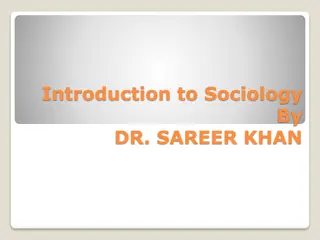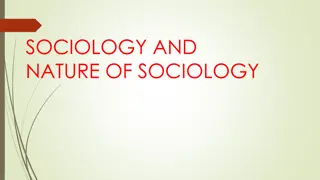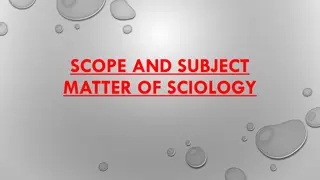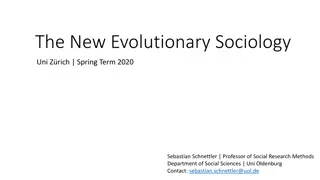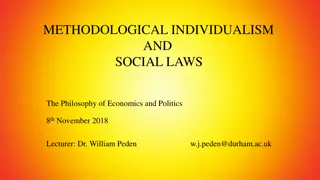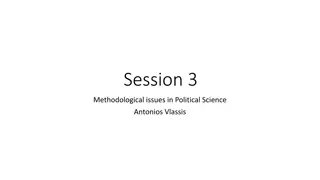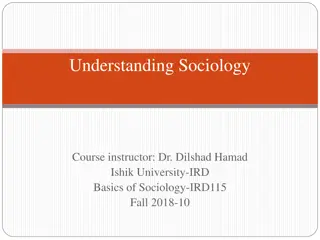Exploring Methodological Individualism in Sociology of Knowledge
Delve into the concept of methodological individualism within the sociology of knowledge, as scholars like Renaud Fillieule and Raymond Boudon emphasize the importance of understanding collective beliefs through the lens of individualistic methodology. Classical works by Robert Merton further enrich our understanding of mental productions and their sociological analysis, shedding light on the existential basis of beliefs. Explore the explanations behind collective beliefs, such as the impact of machines on mass unemployment, and the sociological frameworks that contextualize these phenomena.
- Methodological Individualism
- Sociology of Knowledge
- Cognitive Sociology
- Collective Beliefs
- Social Sciences
Download Presentation

Please find below an Image/Link to download the presentation.
The content on the website is provided AS IS for your information and personal use only. It may not be sold, licensed, or shared on other websites without obtaining consent from the author. Download presentation by click this link. If you encounter any issues during the download, it is possible that the publisher has removed the file from their server.
E N D
Presentation Transcript
Methodological individualism/ sociology of knowledge/ cognitive sociology Renaud Fillieule Universit de Lille - CLERS UMR 8019 Methodological Individualism and Contemporary Social Sciences 6-7 July 2023 - Sorbonne University - GEMASS
Introduction Raymond Boudon 1997 For all those who adhere to the principles of an individualistic methodology, a collective belief can only be explained insofar as it makes sense for an ideal- typical subject
Introduction Raymond Boudon 1997 For all those who adhere to the principles of an individualistic methodology, a collective belief can only be explained insofar as it makes sense for an ideal- typical subject Main thesis of the chapter The sociology of knowledge, just like any other field in the social and economic sciences, greatly benefits from the application of an individualistic methodology.
Classical sociology of knowledge Robert Merton The sociology of knowledge 1945
Classical sociology of knowledge Robert Merton The sociology of knowledge 1945 Where is the existential basis of mental production located? What mental productions are being sociologically analyzed? How are mental productions related to the existential basis?
Explanation of a collective belief Machines create mass unemployment
Explanation of a collective belief Machines create mass unemployment An explanation by reasons (MI)
Explanation of a collective belief Machines create mass unemployment An explanation by reasons (MI) A sociological explanation 1. Collective belief 2. Social-economical context 3. Social experience
Explanation of a collective belief Machines create mass unemployment An explanation by reasons (MI) A sociological explanation 1. Collective belief 2. Social-economical context 3. Social experience The problem with the classical approach
MI versus polylogism Is reason universal or socially determined?
MI versus polylogism Is reason universal or socially determined? Lucien L vy-Bruhl and the primitive mentality
MI versus polylogism Is reason universal or socially determined? Lucien L vy-Bruhl and the primitive mentality Are cognitive biases a sign of a pre-logical mentality or of subjective rationality ?
Quotes against polylogism a systematically correct scientific proof in the social sciences, if it is to achieve its purpose, must be acknowledged as correct even by a Chinese Popper 1945 the unity of human reason uniformity and immutability of the logical structure of the human mind Boudon 1990 universality of the rules of functioning of thought Weber 1904 Mises 1949
MI versus false consciousness Engels Letter to Franz Mehring 1893 Ideology is a process accomplished by the so-called thinker consciously, it is true, but with a false consciousness. The real motive forces impelling him remain unknown to him; otherwise it simply would not be an ideological process.
MI versus false consciousness Engels Letter to Franz Mehring 1893 Ideology is a process accomplished by the so-called thinker consciously, it is true, but with a false consciousness. The real motive forces impelling him remain unknown to him; otherwise it simply would not be an ideological process. Commodity fetishism as counter-example
MI versus the strong programme David Bloor Knowledge and social imagery 1976 1. Causality 2. Impartiality 3. Symmetry 4. Reflexivity
MI versus the strong programme David Bloor Knowledge and social imagery 1976 1. Causality 2. Impartiality 3. Symmetry 4. Reflexivity Causal model vs teleological model
MI versus social constructivism Bruno Latour & Steve Woolgar Laboratory life: The construction of scientific facts1979
MI versus social constructivism Bruno Latour & Steve Woolgar Laboratory life: The construction of scientific facts1979 There is no external reality prior to the social interactions between lab scientists and their machines
MI versus social constructivism Bruno Latour & Steve Woolgar Laboratory life: The construction of scientific facts1979 There is no external reality prior to the social interactions between lab scientists and their machines The deconstruction of scientific facts?
MI versus social constructivism Bruno Latour & Steve Woolgar Laboratory life: The construction of scientific facts1979 There is no external reality prior to the social interactions between lab scientists and their machines The deconstruction of scientific facts? {Estrangement & hubris} vs {understanding and humility}
From sociology of knowledge to cognitive sociology R. K. Merton The sociology of knowledge 1945 thought has an existential basis in so far as it is not immanently determined and in so far as one or another of its aspects can be derived from extra- cognitive factors
From sociology of knowledge to cognitive sociology R. K. Merton The sociology of knowledge 1945 thought has an existential basis in so far as it is not immanently determined and in so far as one or another of its aspects can be derived from extra- cognitive factors Larry Laudan Progress and its problems 1977 the sociology of knowledge may step in to explain beliefs if and only if those beliefs cannot be explained in terms of their rational merits
From sociology of knowledge to cognitive sociology Types of knowledge True or validated False or questionable (ex. science) Epistemology (ex. ideology) Multi-discipline Rational: Types of cognition A-rational: Popper, Laudan, etc. Modern sociology Boudon, Horton, etc. Classical sociology explanation social factors of knowledge of knowledge Bloor, Latour, etc. Marx, Mannheim




